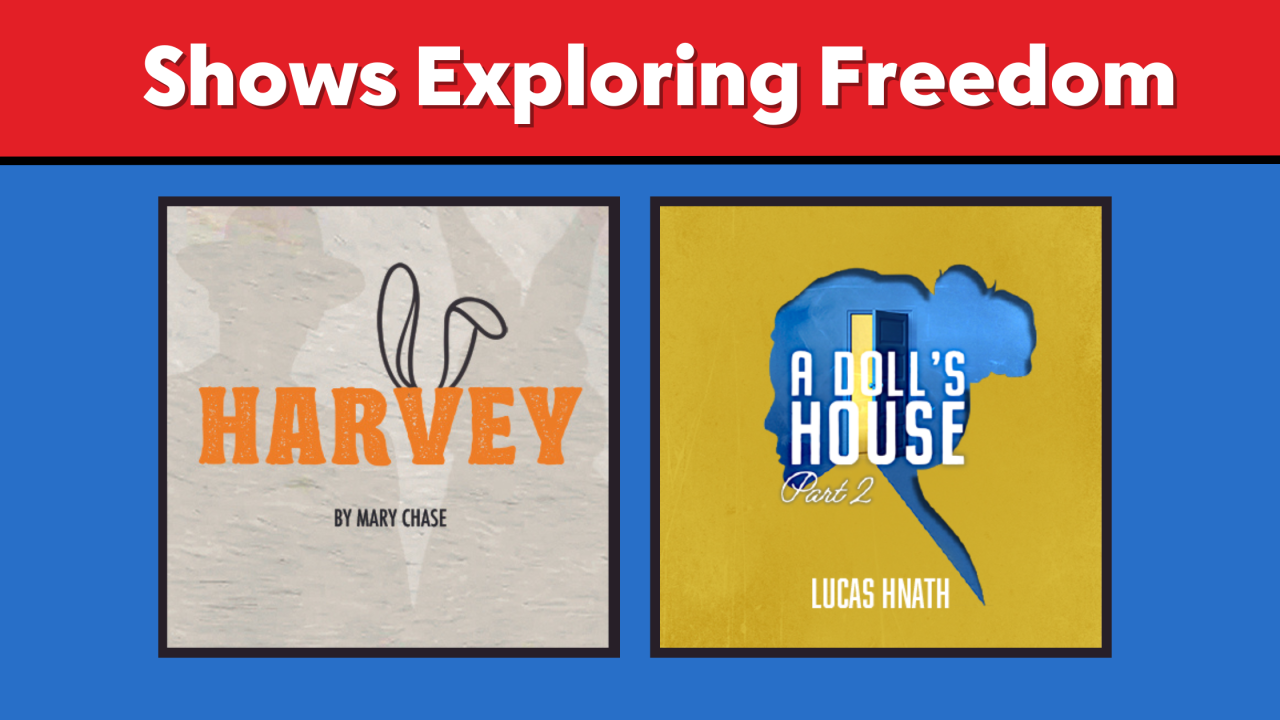This month we are featuring musicals and plays that explore and celebrate the concept of freedom. Whether it is freedom of speech, press, religion, or one’s body, but also how those freedoms are protected and the lives of veterans after their service is done.
Harvey by Mary Chase
THE STORY: Elwood P. Dowd insists on including his friend Harvey in all of his sister Veta’s social gatherings. Trouble is, Harvey is an imaginary six-and-a-half-foot-tall rabbit. To avoid future embarrassment for her family—and especially for her daughter, Myrtle Mae—Veta decides to have Elwood committed to a sanitarium. At the sanitarium, a frantic Veta explains to the staff that her years of living with Elwood’s hallucination have caused her to see Harvey also, and so the doctors mistakenly commit her instead of her mild-mannered brother. The truth comes out, however; Veta is freed, and the search is on for Elwood, who eventually arrives at the sanitarium of his own volition, looking for Harvey. But it seems that Elwood and his invisible companion have had a strange influence on more than one of the doctors. Only at the end does Veta realize that maybe Harvey isn’t so bad after all.
The Revolutionists by Lauren Gunderson
THE STORY: Four beautiful, badass women lose their heads in this irreverent, girl-powered comedy set during the French Revolution’s Reign of Terror. Playwright Olympe de Gouges, assassin Charlotte Corday, former queen (and fan of ribbons) Marie Antoinette, and Haitian rebel Marianne Angelle hang out, murder Marat, and try to beat back the extremist insanity in 1793 Paris. This grand and dream-tweaked comedy is about violence and legacy, art and activism, feminism and terrorism, compatriots and chosen sisters, and how we actually go about changing the world. It’s a true story. Or total fiction. Or a play about a play. Or a raucous resurrection…that ends in a song and a scaffold.
A Doll’s House, Part 2 by Lucas Hnath
THE STORY: In the final scene of Ibsen’s 1879 groundbreaking masterwork, Nora Helmer makes the shocking decision to leave her husband and children, and begin a life on her own. This climactic event—when Nora slams the door on everything in her life—instantly propelled world drama into the modern age. In A DOLL’S HOUSE, PART 2, many years have passed since Nora’s exit. Now, there’s a knock on that same door. Nora has returned. But why? And what will it mean for those she left behind?
Inherit the Wind by Jerome Lawrence and Robert E. Lee
THE STORY: This lively courtroom drama dives into the 1925 Scopes Monkey Trial, where a Tennessee teacher was tried for teaching the theory of evolution. Two persuasive attorneys argue the case in an effort to determine the balance of church and state.
Roe by Lisa Loomer
THE STORY: Roe v. Wade, the landmark 1973 case that legalized abortion, is still fiercely debated over forty years later. In this incisive play, acclaimed writer Lisa Loomer cuts through the headlines and rhetoric to reveal the divergent personal journeys of lawyer Sarah Weddington and plaintiff Norma McCorvey (“Jane Roe”) in the years following the fateful decision. In turns shocking, humourous, and poignant, ROE reflects the polarization in America today while illuminating the heart and passion each side has for its cause.
Fifth of July by Lanford Wilson
THE STORY: The scene is a sprawling farmhouse in rural Missouri, which is home to Ken, a legless Vietnam veteran, and his lover, Jed, a horticulturist. They are visited by Ken’s sister, June, and her teenage daughter, and by Gwen and John—the former a hard-drinking, pill-popping heiress who aspires to be a rock star, the latter her wary-eyed husband and manager. All are old friends from college days, and former activists who agitated for what they hoped would be a better world. The action centers on Gwen’s offer to buy the farm, which she plans to convert into a recording center, and on Ken’s Aunt Sally, who has come to the family homestead to scatter the ashes of her late husband. Their talk, as the play progresses, is sharp and funny and, in the final essence, deeply revealing of lost hopes and dreams and of the bitterness that must be fought back if one is to perceive the good that life can offer.
The Exonerated by Jessica Blank and Erik Jensen
THE STORY: Culled from interviews, letters, transcripts, case files and the public record, THE EXONERATED tells the true stories of six wrongfully convicted survivors of death row in their own words. In this ninety-minute intermissionless play, we meet Kerry, a sensitive Texan brutalized on death row for twenty-two years before being exonerated by DNA evidence; we meet Gary, a Midwestern organic farmer condemned for the murder of his own parents and later exonerated when two motorcycle-gang members confess. We meet Robert, an African-American horse groomer who spent seven years on death row for the murder of a white woman before evidence emerges that the victim was found clutching hair from a Caucasian attacker. We hear from David, a shy man with aspirations to the ministry, bullied into confessing at eighteen to a robbery/murder he had nothing to do with, scarred from a youth spent in prison and struggling to regain his faith; and from Sunny, a bright-spirited hippie who, along with her husband, spent seventeen years in prison for the murder of two police officers—while another man confessed and was ignored by the courts. And we meet Delbert, a poet who serves as the play’s center, convicted of a rape/murder in the Deep South of the 1970s and later freed when evidence surfaced showing that he was not even in the town when the crime occurred. Moving between first-person monologues and scenes set in courtrooms and prisons, the six interwoven stories paint a picture of an American criminal justice system gone horribly wrong—and of six brave souls who persevered to survive it.
Auntie Mame by Jerome Lawrence and Robert E. Lee
THE STORY: This fabulously successful hit hardly needs introduction. Besides being the source for one of America’s most popular musicals, AUNTIE MAME set a standard for Broadway comedy that’s been sought after ever since. “Auntie Mame was a handsome, sparkling, scatterbrained and warm-hearted lady who brightened the American landscape from 1928 to the immediate past by her whimsical gaiety, her slightly madcap adventures and her devotion to her young nephew, who grew up to be Patrick Dennis. Through fortunes that rose and fell and a pleasant but brief marriage to a likable Southerner, who had the bad luck to tumble down from the Matterhorn, Auntie Mame’s chief concern was that nephew, whom she raised…[the play’s] central figure is a woman of spirit, innate kindness and undefeatable courage…” —New York Post.
Geometry of Fire by Stephen Belber
THE STORY: In this play based on a true story, we find an investment-banker-turned-Marine-sniper recently returned from Iraq and a Saudi-American who just wants to get laid. In any other world, these two guys would be best friends. But when their lives collide in this one, each is forced to survive on the fly.
It Can’t Happen Here by Sinclair Lewis, adapted by Tony Taccone and Bennett S. Cohen
THE STORY: A cautionary dark satire about the fragility of democracy and how fascism can take hold even in the land of liberty, IT CAN’T HAPPEN HERE follows the ascent of a demagogue who becomes president of the United States by promising to return the country to greatness. Witnessing the new president’s tyranny from the sidelines is a liberal, middle-class newspaper editor from Vermont who trusts the system will fix itself—until he ends up in a prison camp. Sinclair Lewis’ eerily prescient 1935 novel gets a fresh update in this adaptation that examines what brings a citizenry to the point of sacrificing its own freedom and how a courageous few can prevail to overcome the fall.





